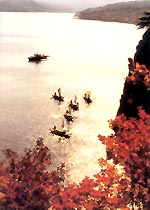Songhua Lake
 Built over 40 years ago, the famous Fengman Power Station is located in the suburb of Jilin City, Jinlin Province. Its 1,000-meter-long and 100-meter-high dam cuts the Songhua River in the middle and forms on the upper reaches a huge artificial lake named the Songhua Lake. Built over 40 years ago, the famous Fengman Power Station is located in the suburb of Jilin City, Jinlin Province. Its 1,000-meter-long and 100-meter-high dam cuts the Songhua River in the middle and forms on the upper reaches a huge artificial lake named the Songhua Lake.
The narrow Songhua Lake is 200 kilometers long, about 10 kilometers at its widest, and 75 meters at its deepest. It is one of the famous artificial lakes in China.
Among the numerous islets lying in the lake, the most famous and the largest one is Five Tigers Island. The lake has a shape of five tigers playing in the water, hence the name of Five Tigers Island. The island is covered with exuberant forest with the fragrance of wild flowers drifting in the air. Some facilities are constructed on the island, including rest rooms and restaurants. Going up the Songhua River by boat from the island, one will find the most beautiful view of the Songhua Lake -- Hua Lazi (colorful stones). Countless small stones stick out of the water, while immense pine forest stretches on the hillside. The peaceful water, strange stones and graceful pine trees make a fascinating landscape.
Various trees grow along the lakeside, including willow, birch, red pine, and white pine. The area is also abundant in medicinal materials such as genseng and the fruit of Chinese magnoliavine, and local special products such as mountain grape, filbert, and mushroom. Moreover, the lake has various species of fish, including white fish, bream, carp, and silver carp. The white fish is reputed as the slap-up feed of the Songhua Lake for its delicious flesh, while the bream flesh makes the best soup.
A special area named listen to the sound of waves is set up in the Songhua Lake Scenic Area. Its main sights include Xingyin Pavilion, Changtian Building, Jiunvdun Monument, and Huguang Pavilion. The Xingyin Pavilion was built in memory of the patriotic poet Qu Yuan. Located between Hefeng Bridge and the Luoyu Bridge, the three-storeyed pavilion features a traditional style with green tiles and columns.
Source: http://www.chinaculture.org |
